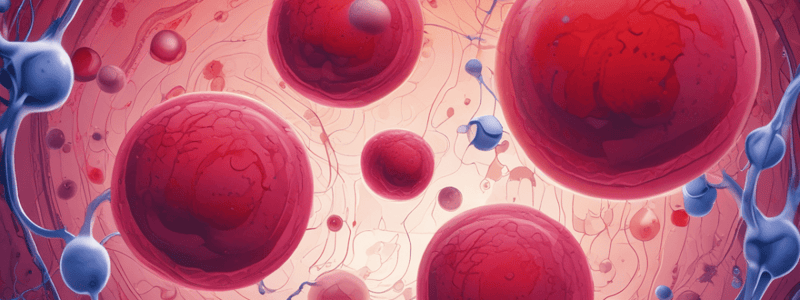Podcast
Questions and Answers
What is the function of T cells in the human body?
What is the function of T cells in the human body?
What is the name of the cell that gives rise to all blood cells?
What is the name of the cell that gives rise to all blood cells?
Where do blood cells come from in the human body?
Where do blood cells come from in the human body?
What type of bones are responsible for producing blood cells?
What type of bones are responsible for producing blood cells?
Signup and view all the answers
What is the name of the flat bone that connects to all the ribs?
What is the name of the flat bone that connects to all the ribs?
Signup and view all the answers
How many different kinds of blood cells are there in the human body?
How many different kinds of blood cells are there in the human body?
Signup and view all the answers
What is the function of platelets in the human body?
What is the function of platelets in the human body?
Signup and view all the answers
What is the name of the bone that is the long bone in the arm?
What is the name of the bone that is the long bone in the arm?
Signup and view all the answers
What is the meaning of the term 'pluripotent'?
What is the meaning of the term 'pluripotent'?
Signup and view all the answers
What is the primary function of megakaryocytes?
What is the primary function of megakaryocytes?
Signup and view all the answers
What type of cell does a monocyte become once it settles in the tissues?
What type of cell does a monocyte become once it settles in the tissues?
Signup and view all the answers
Which of the following cells is responsible for producing antibodies?
Which of the following cells is responsible for producing antibodies?
Signup and view all the answers
What is the term for the cells that come from the lymphoid lineage and are involved in the immune response?
What is the term for the cells that come from the lymphoid lineage and are involved in the immune response?
Signup and view all the answers
What is the name of the cell that comes from both the myeloid and lymphoid lineages?
What is the name of the cell that comes from both the myeloid and lymphoid lineages?
Signup and view all the answers
Which of the following cells is not a type of phagocytic cell?
Which of the following cells is not a type of phagocytic cell?
Signup and view all the answers
What is the term for the 'grandfather cell' that gives rise to all blood cells?
What is the term for the 'grandfather cell' that gives rise to all blood cells?
Signup and view all the answers
What type of cell is responsible for eating up invaders like bacteria?
What type of cell is responsible for eating up invaders like bacteria?
Signup and view all the answers
What is the name of the cell that comes from the myeloid lineage and is involved in the immune response?
What is the name of the cell that comes from the myeloid lineage and is involved in the immune response?
Signup and view all the answers
Study Notes
Blood Vessels and Blood Cells
- Blood vessels in the human body contain various types of blood cells, including red blood cells, T cells, B cells, macrophages, neutrophils, and platelets.
- There are approximately 10 different kinds of blood cells in the human body.
Bone Marrow and Blood Cell Origin
- All blood cells in the body come from the bone marrow.
- The bone marrow responsible for producing blood cells is located in specific parts of the body, such as the head of long bones (e.g., femur and humerus) and flat bones (e.g., sternum).
- The sternum is a flat bone that connects to the ribs.
Hematopoietic Stem Cell
- There is a single precursor cell, called the pluripotent hematopoietic stem cell, that gives rise to all blood cells.
- This grandfather cell is called pluripotent because it can give rise to any of the 10 blood cells.
Lineages of Blood Cells
- The hematopoietic stem cell gives rise to two lineages: the myeloid lineage and the lymphoid lineage.
- The myeloid lineage gives rise to:
- Red blood cells, which are biconcave in shape.
- Megakaryocytes, which produce platelets.
- Monocytes, which become macrophages once they settle in tissues.
- Neutrophils, eosinophils, and basophils.
- The lymphoid lineage gives rise to:
- B cells, which produce antibodies.
- T cells, which have their own functions in the immune system.
- Natural killer cells (NK cells).
Additional Blood Cells
- Dendritic cells come from both the lymphoid and myeloid lineages by way of monocytes.
- Mast cells come from the myeloid lineage and are notable for causing allergic reactions by releasing histamine.
Studying That Suits You
Use AI to generate personalized quizzes and flashcards to suit your learning preferences.
Description
This quiz is about the different components of blood vessels and blood cells in the human body, including red blood cells, T cells, B cells, macrophages, neutrophils, and platelets.



